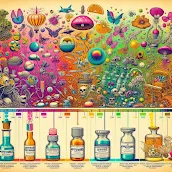A Brief History of Amphetamines
- Ancient Origins: The use of amphetamines can be traced back to ancient China, where the herb Ephedra sinica (ma huang) was used to treat asthma and other respiratory ailments.
- Isolation and Synthesis: The active ingredient in ma huang, ephedrine, was isolated in the 19th century. In 1887, the synthetic compound amphetamine was created.
- Therapeutic Use: Amphetamine was initially marketed as a treatment for a variety of conditions, including asthma, narcolepsy, and depression.
- Abuse and Addiction: Despite its intended medical uses, amphetamine soon became popular for non-medical purposes leading to widespread abuse and addiction.
The Popularity of Amphetamines
- Potency and Duration: Amphetamines have a more potent and sustained effect than cocaine.
- Multiple Routes of Administration: Amphetamines can be taken orally, intravenously, or intranasally.
- Easy Synthesis: The precursors for amphetamine production are readily available, making it relatively easy to synthesize illicitly.
Types of Amphetamines
Amphetamine: The original form of amphetamine, often sold under the brand names Benzedrine and Dexedrine. Methamphetamine: A more potent form of amphetamine that is highly addictive. Synthetic Cannabinoids: A group of synthetic drugs that mimic the effects of cannabis but are often more potent and dangerous. (Rosental, 2022)
The Impact of Amphetamine Abuse
- Heart problems: Increased heart rate, blood pressure, and risk of heart attack or stroke.
- Psychosis: Hallucinations, delusions, and paranoia.
- Addiction: Amphetamines are highly addictive, and withdrawal symptoms can be severe.
- Overdose: Overdosing on amphetamines can be fatal.
Efforts to Combat Amphetamine Abuse
- Regulation of precursor chemicals: Laws have been enacted to restrict the sale of chemicals used to produce amphetamines.
- Treatment and prevention programs: Treatment programs and public health campaigns aim to reduce amphetamine use and addiction.
- Law enforcement efforts: Law enforcement agencies work to disrupt the production and distribution of amphetamines.
References
- Rosenthal, M. S. (2022). Drugs: Mind, Body, and Society (2nd ed.). Oxford University Press Academic US. https://bookshelf.vitalsource.com/books/9780197585313








